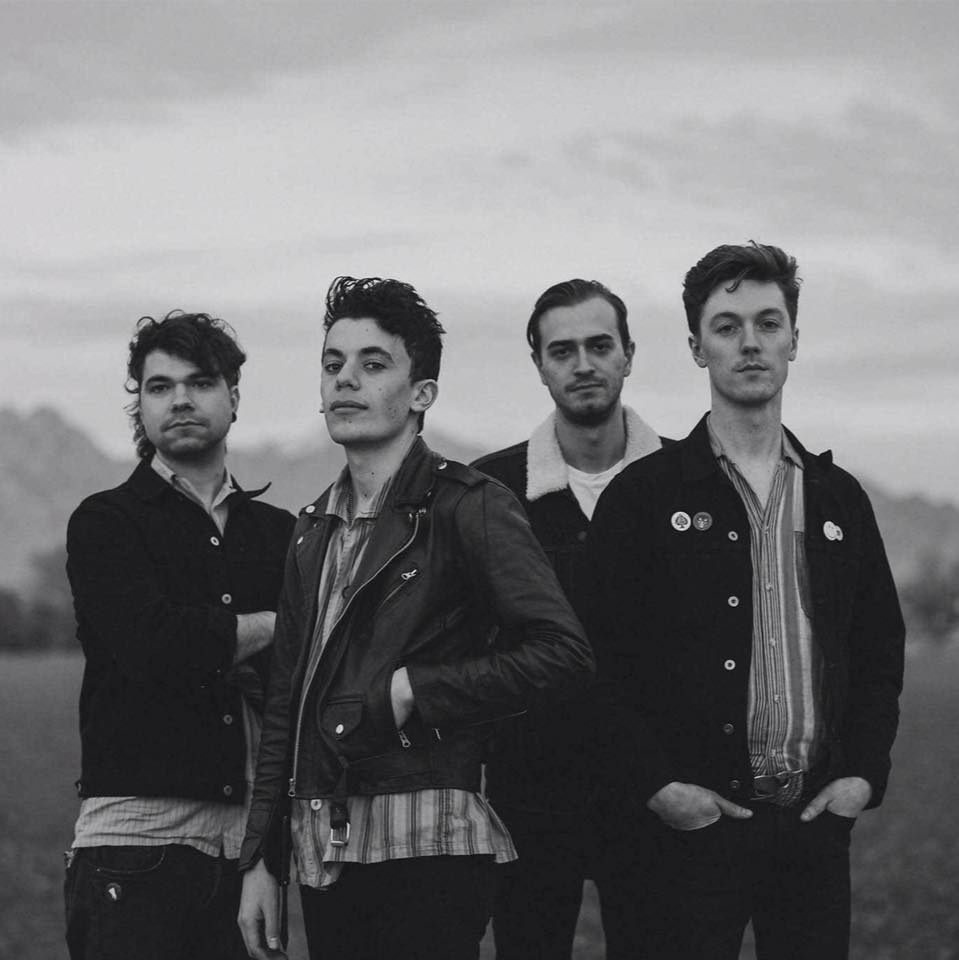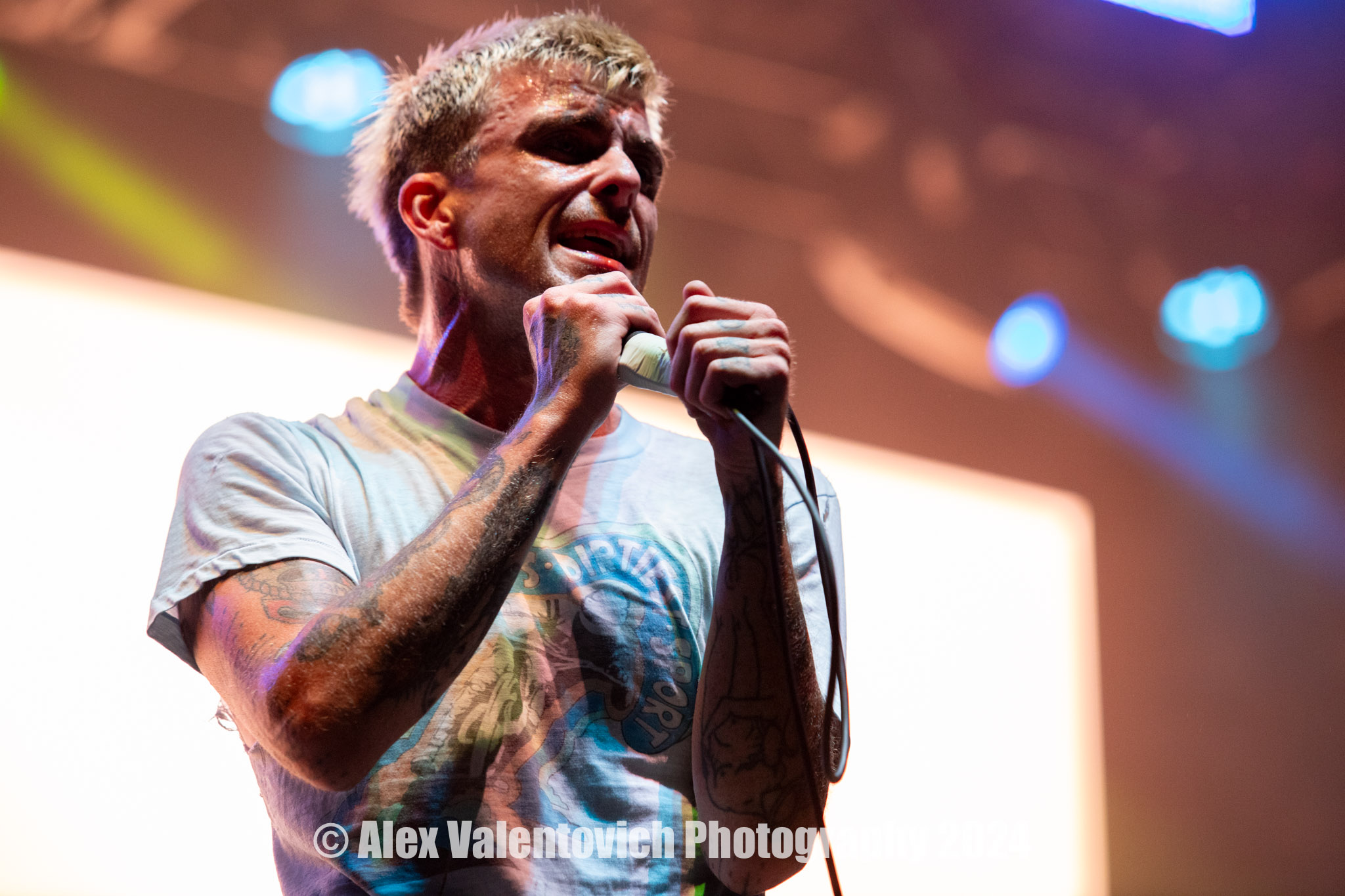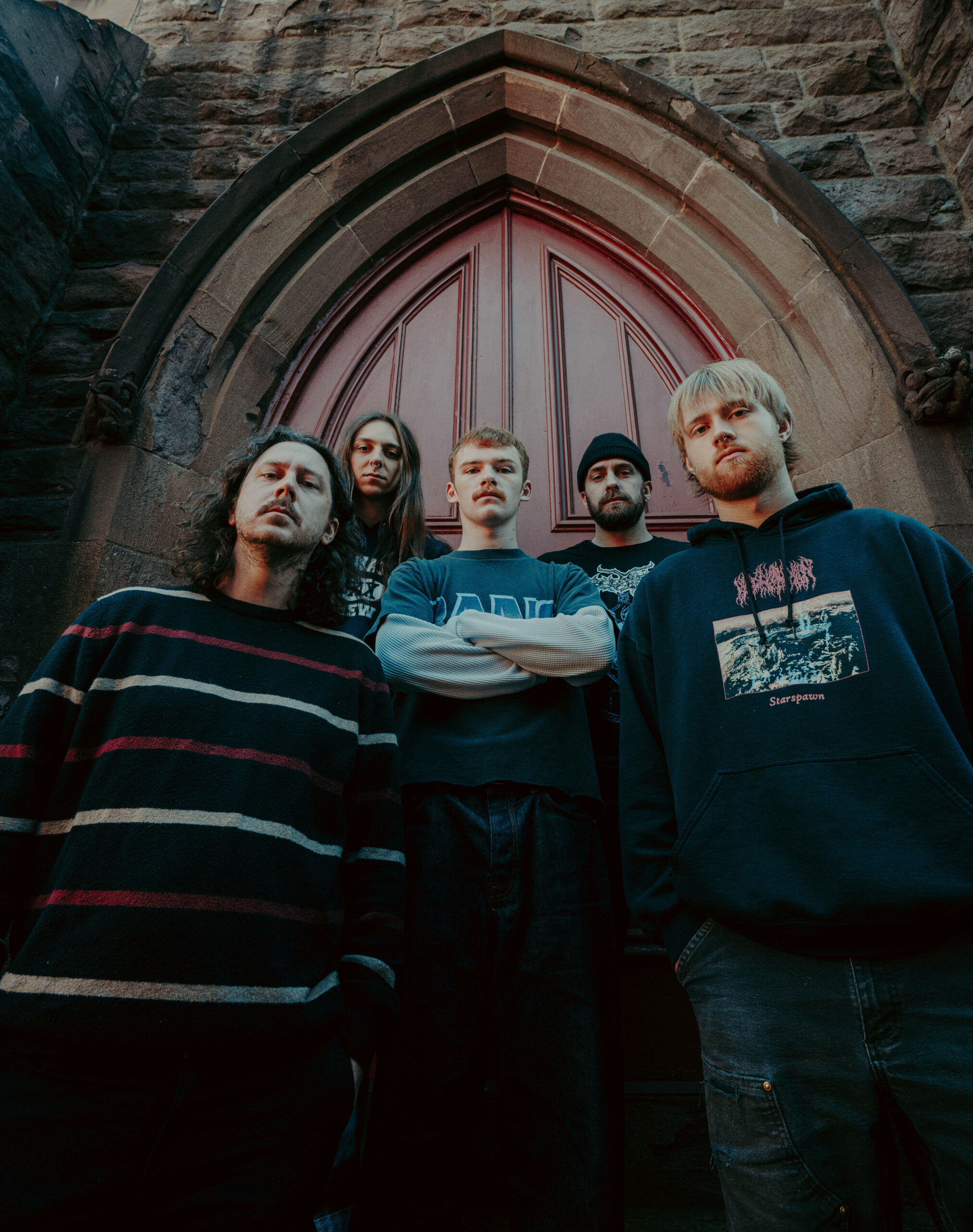I was recently fortunate enough to sit with New York City’s Mainland. This alternative rock group has been paying their dues for years, and recently began making waves in the industry. Having released two EP’s, signing to the label 300 Entertainment, playing South By Southwest, and now opening for Melanie Martinez, they’re on the road to success. I met with Jordan Topf (lead vocals, guitar), Corey Mullee (synth, guitar), and Alex Pitta (bass, vocals) in their greenroom at The Ritz Ybor in Tampa, Florida, a few hours before show time.
How are you guys feeling today?
Jordan: Good. Feeling great.
Excited for the show tonight?
Jordan: Excited for the show. We played Sayreville, New Jersey a few days ago. It was the first date of the Cry Baby Tour with Melanie Martinez. It was our biggest show to date. It was 2,500 people and that was well received. We’re excited to play Florida again. We were here in January and it’s nice to be back. It’s our first time playing Tampa and we play House Of Blues, Orlando on Sunday. Then we head up to Atlanta, and through the south, heading west. We’re excited.
You mentioned the reception being great. Do you feel as though the Melanie Martinez fanbase is reacting well to your style of music? While it’s a different, on your Facebook you guys labeled your genre as “Top 40.” At first I thought it was your way of being funny but it seems more of a statement to where you’re headed. After listening to your music, I noticed the amalgam of styles present. You add brass, keys, synth, and varying style of rock and pop while maintaining an 80’s vibe that fits into the contemporary scene which is evident in “Top 40,” because realistically “Top 40” music is whatever is successful.
Jordan: [Laughs] You’re the first person to ever comment on that so that’s really cool.
Corey: I think when we put that in our profile, it was a joke at the time, but behind the joke it’s –
Jordan: It’s a goal.
Is it also the music?
Jordan: What is the genre of “Top 40?” Iggy Pop was number one last week.
Corey: Whatever the DJ’s are spinning, whatever’s selling: that’s “Top 40.”
It’s a really interesting thing to label yourselves as because realistically you’re saying that your genre is changing and that anything can be “Top 40.”
Jordan: We’re not afraid to be the biggest and the best. I think for the Alternative Rock genre; we don’t want to be too tied down to that. We would rather cross over. At the heart of it, a lot of our influences were “Top 40” bands from the 80’s. You hear a lot of Pop artists nowadays referencing that same vibe but we’re doing it in more of a Rock sense and there’s not a lot of Rock bands trying to write big Pop songs masked that way. Someone once told me that all popular music of our time is just masked in different ways. Like Kings Of Leon, for example, they’re just a Pop band masked within the Rock genre.
So, you guys mentioned having played in Florida before, how do you like being here?
Jordan: The warm weather is a plus.
Corey: Yes. It’s just nice to be able to take off a jacket.
Alex: We’ve spent most of our winter in the coldest parts of the country.
Jordan: Recently we had about nine or ten days off, we had just done seven weeks of touring, South By Southwest, then came home, and it was still cold. I remember reading it was the first day of Spring, maybe the day after we got back, and I was like this is not Spring.
Corey: Today, for example, it was raining but it was so warm out. I went to the hotel pool this morning and I just swam in the rain, and watched the lightning over head.
Relatively dangerous.
Alex: That’s the worst place to be.
Corey: [Laughs] Apparently that’s pretty dangerous.
When you guys are touring, do you research the cities you’re traveling to?
Corey: We do research. We look up what historic musicians have come from each town or state.
Jordan: The last time we came to Florida actually, we Wikipedia’d musicians from Florida. We were listening to Against Me!, Tom Petty, and Marilyn Manson. We often don’t have a lot of time. We had a 21 hour drive. We did have a day off and we like going to thrift stores in our spare time. It’s kinda like a relaxing activity to get your mind off the show. We have friends in this band called, Arkells, and they’d watch sports. I think everyone that tours has a thing they do that’s not music that helps them get through the long drives and stuff.
What are you guys doing with free time when you’re not on tour?
Corey: Head out to some of our favorite watering holes. A lot of our friends are bartenders at different spots.
Alex: I’m just been laying low and watching movies.
Jordan: Just recuperating.
Alex: Recuperating you know. It’s nice to be in your own space, and be on your own schedule.
Jordan: There’s a bar in New York I like to go to when I’m home called “Berlin” because all the musicians in New York hang out there. It’s nice to walk in the door and everyone is like, “Hey. How has tour been?” Also writing new material. We don’t really have days off.
What motivates you guys to keep that work ethic?
Jordan: Playing shows like this is the motivation. Every tour we get, it’s returning customers, and new ones. And this tour, it’s a lot of people we’ve never played for because when we hopped on, it was completely sold out. Some of our fans were pretty upset actually because they couldn’t buy tickets.
Well, it’s a win, lose. Obviously it’s unfortunate old fans can’t come but that means mostly new people will be exposed to your music.
Jordan: Yeah. It’s good too.
Alex: It makes it so that the next time we roll through –
Jordan: They have to see us.
Alex: Exactly. It’s a little more dire to get tickets on time.
Corey: On social media, people online are already asking us when we’ll be back.
How exactly did Mainland come to be?
Jordan: I met Corey at a party and we bonded over the fact that we’re both from northern California, and liked a lot of the same bands from the 70’s, 80’s, in New York. I had a band that I wrote music for in college and he saw that band play. We played a house party in Harlem and he came, and checked it out. That later dissolved and I asked him if he wanted to play music with me and we struck up a friendship, and started the band. I used to work at a restaurant and I trained Alex. We were friends. Before he joined the band, we actually played his 21st birthday party.
Corey: Happy Birthday, man.
Alex: [Laughs] You mean happy belated?
Jordan: And then Joey joined later on then we made this record. We played around New York for 4 or 5 years before we got signed. We were a local band for a long time. Did a little bit of touring. We met the drummer of Spoon, Jimmy Eno, on our first tour, and ended up recording at his studio in Austin, Texas. That was when things started changing for us. We went to South By South West the next year, and met our first booking agent who introduced us to A&R 300 Entertainment, our current record label. Just been touring ever since.
That’s evidence of longevity. You continuing and pushing for four years really is a statement that you’re hear to stay.
Jordan: Yeah. I think early on we were just trying to figure out what we wanted to say with our music, and how we wanted to present it. It was really trial and error. We were writing a bunch of songs, kind’a figuring out our sound, and then we made the right call by going to Texas and record. It was kind of like the Exodus.
When you went to Austin, that was the Shiner EP you recorded in 6 days, right?
Jordan: Yeah. I mean –
Corey: It was a dream. It was a blur.
Jordan: Because we’re such big Spoon fans too. He was very insightful. We didn’t make our album with him but we made that EP with him and it further influenced the rest of our music. He kind’a picked up on that we were really into Post-Punk from England and New York. Then we figured out that it’s kind of our strong suit so we went that direction with the new material but a little bit more Pop influence. He was really instrumental in us figuring out the sound of the band.
You have released two EP’s so far: Shiner in 2014, and Outcast in 2015. Are you guys noticing any fan favorites when you’re performing live?
Corey: “A Bit Out Of Time.”
Alex: “Outcast” is always a favorite.
Jordan: “Outcast” is a favorite, because people know it. Yeah, “A Bit Out Of Time” gets a lot of love. That’s track two on the Outcast EP, that’s a personal one, and a song we haven’t released yet, “Beggars.” I’m really excited about that one.
So, you’re playing new songs live?
Jordan: We’ve been doing that one live for a while. It’s influenced by west coast Hip Hop. We’re really excited to get that one out. That one gets a good response.
You have a new album coming out soon, Night Trials. Does that have a release? Any single release coming up?
Jordan: [Laughs] Can’t say. It’s a secret.
Corey: For now.
Jordan: We’re really excited to release some new stuff because the reaction to the Outcast EP was strong but we have an even stronger follow up. The album’s got some ballads on it. I’m excited for people to hear. It’s got some grand piano and stuff.
Speaking of ballads, did you guys possibly experiment with anything new that isn’t present in your previous work?
Jordan: Well, I think as you get deeper in the album there’s some upbeat songs and there’s some really dark songs too, on the album. More stuff with piano. More synths. More dark sub synths on some of the later tracks on the album.
Corey: The diversity you hear on the Outcast EP is expanded upon even more on the new album. You keep hearing new times of the songs. There’s more somber songs on the album than you hear on the Outcast EP.
Jordan: I think, honestly, the deeper, more somber cuts on the album are my personal favorites.
Are all the lyrics nonfiction? Personal?
Jordan: They’re all personal. All our songs are true stories.
Corey: Even some political elements to some of the tracks. Not even about a specific person, but about the world.
Jordan: Yeah. We’re not a political band by any means but there’s certain happened in our environment in New York that I felt like writing about. I think it’s important not to just write songs about love. We are really inspired by The Clash: the way they dress, the things they sing about, their attitude.
Corey: It was their manager that said to them, “Don’t write any songs that are love songs.” They took that and you hear it across their albums. It’s hard to find a love song in a Clash album.
Jordan: There’s maybe two love songs in the entire discography. “Lover’s Rock” and “Train In Vein.”
Corey: They have a couple love songs, but everything is basically about the world around them.
Jordan: There’s a couple of those, semi-reactionary, environment kind of songs on our new album.
For you guys to address any matter is positive. You’re shedding light, and possibly teaching listeners about current problems.
Corey: You know, it’s interesting: a song should have drama in it. There should be stakes in a song. A lot of times, it’s a love song so that’s the drama. If you take the love aspect out of the situation, it can become more life and death. If you’re looking for drama outside of love, it can get very intense.
Jordan: Yeah. We have a song about murder.
I’m assuming that’s one of the more somber tracks.
Corey: [Laughs] Yeah. It’s one of the more somber tracks on the album.
Jordan: It’s about the N.Y.P.D. It’s a real New York album. The last song on the album is about living in the digital age. I think some people have written about it but we’ve never touched on that topic. I think it’s interesting. It’s a song about not feeling hear, feeling swept under the rug, feeling lost, not having a voice in the digital age. It’s called “Scream.”
Alex: It can be applied to so many things too. With the election going on, a voice not being heard. We were talking about the super delegates. It just continues to be relevant no matter what the scenario is.
Jordan: I think our more sociopolitical songs aren’t necessarily about one thing.
Alex: They’re not activist songs. It’s more neutral.
Jordan: It’s more about how do you feel being tied down to a television screen in front of your face.
Corey: Art shouldn’t really be partisan, you know? It’s more about universal things that anyone could relate to. Don’t pick a side. Leave it open ended. It’s a way for people to observe the way they feel.
Jordan: You remind them of the subject matter. They can live in that, and react to it how they want to.
With the album coming out sometime this year, do you guys have any tours lined up to promote it?
Jordan: We’re doing this run with Melanie Martinez then we’re doing a couple shows with Rooney. Those are in May. We’re doing Boston, Philly, New York, and D.C. After that, we’re doing a Summer show for WBRU, the radio station in Province. They have a concert series in the summer for the station. Then after? We’ll probably be all over.
Thank you so much for the time, guys. Now, for more of a fun note to end this on: it’s 2017, you’re on the “Top 40,” headlining a world tour. Who’s gonna be on your tour?
Corey: Ooh. That’s a good one.
Jordan: Declen Makenna.
Alex: I want The Killers to open for us.
[Corey and Jordan laugh]
Not just Brandon Flowers?
Corey: No. I want them to reunite to tour with us.
Jordan: This is our chance to highlight the bands that haven’t made it yet.
You could finally bring Peace to the U.S.
Jordan: Oh, yeah, Peace.
Alex: Peace would be cool.
Jordan: DZ Deathrays.
Alex: That would be sick. They’re like the anti-Death From Above.
Jordan: They’re like Black Sabbath.
Alex: They are like Black Sabbath too. They’re like a really heavy band. It’s just drums and two guitars. It’s sick.
Keep up to date with Mainland !
Facebook, Instagram, Twitter.




